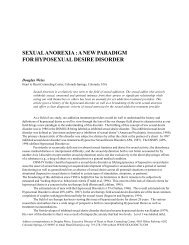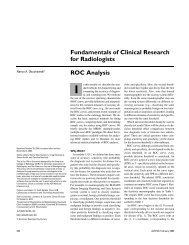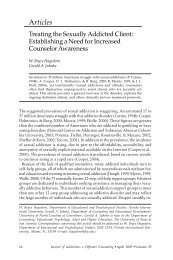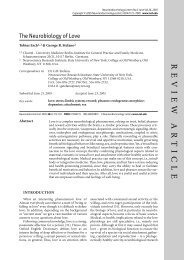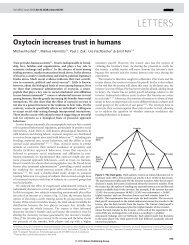An Overview of Psychiatric Ethics
An Overview of Psychiatric Ethics
An Overview of Psychiatric Ethics
You also want an ePaper? Increase the reach of your titles
YUMPU automatically turns print PDFs into web optimized ePapers that Google loves.
4. When the patient is gravely disabled, incapacitated and/or incompetent to exercise properjudgment because <strong>of</strong> a mental disorder, the psychiatrists should consult with the family and,if appropriate, seek legal counsel, to safeguard the human dignity and the legal rights <strong>of</strong> thepatient. No treatment should be provided against the patient’s will, unless withholding treatmentwould endanger the life <strong>of</strong> the patient and/or the life <strong>of</strong> others. Treatment must always be in thebest interest <strong>of</strong> the patient.5. When psychiatrists are requested to assess a person, it is their duty first to inform and advisethe person being assessed about the purpose <strong>of</strong> the intervention, the use <strong>of</strong> the findings, andthe possible repercussions <strong>of</strong> the assessment. This is particularly important when psychiatristsare involved in third party situations.586. Information obtained in the therapeutic relationship is private to the patient and should be keptin confidence and used, only and exclusively, for the purpose <strong>of</strong> improving the mental health<strong>of</strong> the patient. Psychiatrists are prohibited from making use <strong>of</strong> such information for personalreasons, or personal benefit. Breach <strong>of</strong> confidentiality may only be appropriate when requiredby law (as in obligatory reporting <strong>of</strong> child abuse) or when serious physical or mental harm to thepatient or to a third person would ensue if confidentiality were maintained; whenever possible,psychiatrists should first advise the patient about the action to be taken.7. Research that is not conducted in accordance with the canons <strong>of</strong> science and that is notscientifically valid is unethical. Research activities should be approved by an appropriatelyconstituted ethics committee. Psychiatrists should follow national and international rules forthe conduct <strong>of</strong> research. Only individuals properly trained for research should undertake ordirect it. Because psychiatric patients constitute a particularly vulnerable research population,extra caution should be taken to assess their competence to participate as research subjectsand to safeguard their autonomy and their mental and physical integrity. Ethical standardsshould also be applied in the selection <strong>of</strong> population groups, in all types <strong>of</strong> research includingepidemiological and sociological studies and in collaborative research involving other disciplinesor several investigating centres.GUIDELINES CONCERNING SPECIFIC SITUATIONSThe World <strong>Psychiatric</strong> Association <strong>Ethics</strong> Committee recognizes the need to develop a number <strong>of</strong>specific guidelines on a number <strong>of</strong> specific situations. The first five were approved by the GeneralAssembly in Madrid, Spain, on August 25, 1996, the 6 through 8 by the General Assembly inHamburg, Germany, on August 8, 1999, the 9 through 12 by the General Assembly in Yokohama,Japan, on August 26, 2002, and the 13 through 15 at the General Assembly in Cairo, Egypt, onSeptember 12, 2005.1. Euthanasia: A physician’s duty, first and foremost, is the promotion <strong>of</strong> health, the reduction <strong>of</strong>suffering, and the protection <strong>of</strong> life. The psychiatrist, among whose patients are some who areseverely incapacitated and incompetent to reach an informed decision, should be particularlycareful <strong>of</strong> actions that could lead to the death <strong>of</strong> those who cannot protect themselves because<strong>of</strong> their disability. The psychiatrist should be aware that the views <strong>of</strong> a patient may be distortedby mental illness such as depression. In such situations, the psychiatrist’s role is to treat theillness.2. Torture: Psychiatrists shall not take part in any process <strong>of</strong> mental or physical torture, evenwhen authorities attempt to force their involvement in such acts.3. Death Penalty: Under no circumstances should psychiatrists participate in legally authorizedexecutions nor participate in assessments <strong>of</strong> competency to be executed.4. Selection <strong>of</strong> Sex: Under no circumstances should a psychiatrist participate in decisions toterminate pregnancy for the purpose <strong>of</strong> sex selection.5. Organ Transplantation: The role <strong>of</strong> the psychiatrist is to clarify the issues surrounding organdonations and to advise on religious, cultural, social and family factors to ensure that informedand proper decisions be made by all concerned. The psychiatrists should not act as a proxydecision maker for patients nor use psychotherapeutic skills to influence the decision <strong>of</strong> apatient in these matters. Psychiatrists should seek to protect their patients and help themexercise self-determination to the fullest extent possible in situations <strong>of</strong> organ transplantation.



